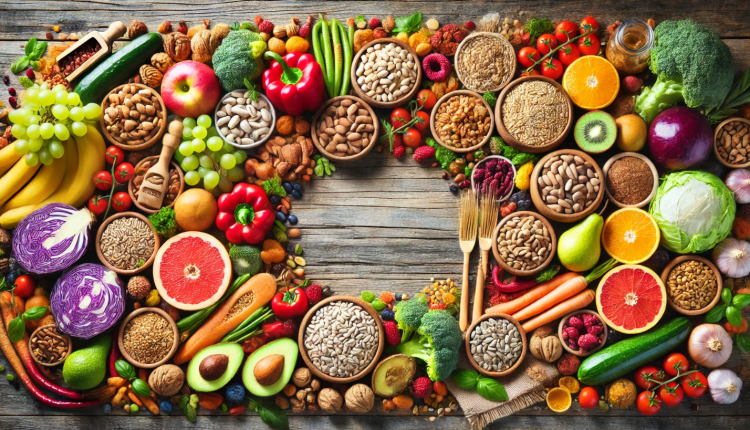Dietary fiber, often referred to as roughage or bulk, is a fundamental component of plant-based foods that the human body cannot digest or absorb. Unlike other food components such as fats, proteins, or carbohydrates, which the body breaks down and absorbs, fiber passes relatively intact through the stomach, small intestine, and colon, and out of the body. Despite its indigestibility, fiber plays a crucial role in maintaining overall health and preventing various diseases. This article delves into the types of dietary fiber, their health benefits, and practical ways to incorporate more fiber into your diet.
Types of Dietary Fiber
Dietary fiber is broadly classified into two categories: soluble and insoluble fiber.
- Soluble Fiber: This type of fiber dissolves in water to form a gel-like substance. It can help lower blood cholesterol and glucose levels. Soluble fiber is found in oats, peas, beans, apples, citrus fruits, carrots, barley, and psyllium.
- Insoluble Fiber: This type of fiber promotes the movement of material through the digestive system and increases stool bulk, benefiting those who struggle with constipation or irregular stools. Whole-wheat flour, wheat bran, nuts, beans, and vegetables such as cauliflower, green beans, and potatoes are good sources of insoluble fiber.
Health Benefits of Dietary Fiber
Incorporating adequate amounts of dietary fiber into your diet offers numerous health benefits:
- Regulates Bowel Movements: Fiber increases the weight and size of your stool and softens it. A bulky stool is easier to pass, decreasing the chance of constipation. If you have loose, watery stools, fiber may help to solidify the stool because it absorbs water and adds bulk.
- Maintains Bowel Health: A high-fiber diet may lower your risk of developing hemorrhoids and small pouches in your colon (diverticular disease). Some fiber is fermented in the colon, and researchers are looking at how this may play a role in preventing diseases of the colon.
- Lowers Cholesterol Levels: Soluble fiber found in beans, oats, flaxseed, and oat bran may help lower total blood cholesterol levels by lowering low-density lipoprotein (LDL), or “bad” cholesterol levels. Studies also have shown that high-fiber foods may have other heart-health benefits, such as reducing blood pressure and inflammation.
- Controls Blood Sugar Levels: In people with diabetes, fiber—particularly soluble fiber—can slow the absorption of sugar and help improve blood sugar levels. A healthy diet that includes insoluble fiber may also reduce the risk of developing type 2 diabetes.
- Aids in Achieving Healthy Weight: High-fiber foods tend to be more filling than low-fiber foods, so you’re likely to eat less and stay satisfied longer. And high-fiber foods tend to take longer to eat and to be less “energy dense,” which means they have fewer calories for the same volume of food.
- May Help You Live Longer: Studies suggest that increasing your dietary fiber intake is associated with a reduced risk of dying from cardiovascular disease and all cancers.
Incorporating More Fiber into Your Diet
To reap the health benefits of dietary fiber, consider the following strategies:
- Choose Whole-Grain Products: Opt for whole-grain breads, cereals, and pastas. Look for products where whole grain is the first ingredient listed.
- Eat More Fruits and Vegetables: Aim to fill half your plate with fruits and vegetables at each meal. These foods are rich in fiber, vitamins, and minerals.
- Include Legumes in Your Diet: Beans, lentils, and peas are excellent sources of fiber. Add them to soups, salads, and casseroles.
- Snack on Nuts and Seeds: Almonds, sunflower seeds, and pistachios are not only nutritious but also high in fiber. Be mindful of portion sizes, as nuts are calorie-dense.
- Choose High-Fiber Snacks: Fresh fruits, raw vegetables, low-fat popcorn, and whole-grain crackers are good options.
Tips for Increasing Fiber Intake
When adding more fiber to your diet, do so gradually over a few weeks to prevent digestive discomfort. Also, drink plenty of water, as fiber works best when it absorbs water, making your stool soft and bulky.
Conclusion
Dietary fiber is an essential component of a healthy diet, offering a multitude of benefits ranging from improved digestive health to reduced risk of chronic diseases. By understanding the types of fiber and incorporating a variety of fiber-rich foods into your meals, you can enhance your overall health and well-being. Remember to make changes gradually and consult with a healthcare provider if you have any specific health concerns or conditions.
- Advertisement -

